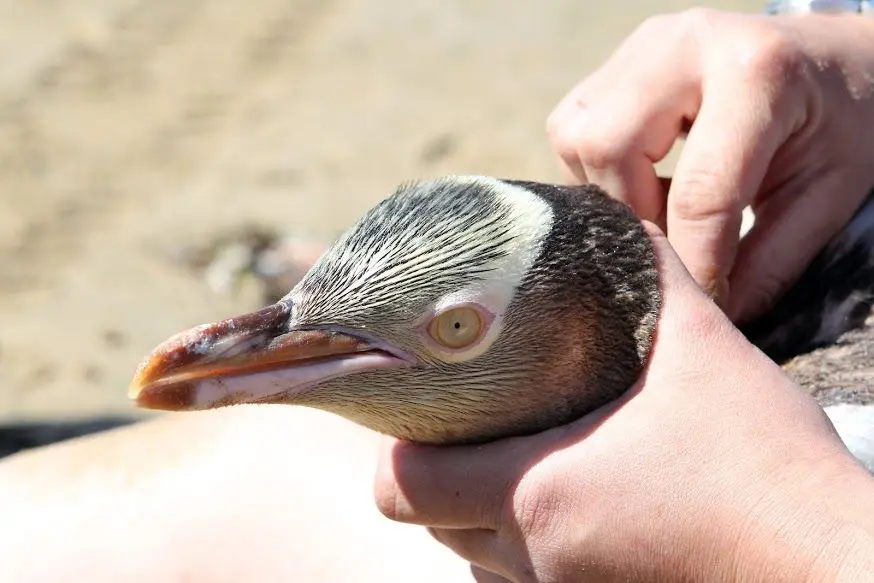
To do this, DOC organise their work around five outcomes:
- the diversity of our natural heritage is maintained and restored
- our history is protected and brought to life
- more people participate in recreation
- more people engage with conservation and value its benefits
- conservation gains from more business partnerships
The BLAKE DOC Ambassador programme started in January 2015 and provides an annual opportunity for young scientists and conservationists to work on conservation projects in New Zealand.
DOC partners with other organisations to manage New Zealand’s conservation through habitat protection and restoration programmes, biodiversity inventory and monitoring research projects.
The 2024/25 programme allows four young New Zealanders to be part of three BLAKE DOC Ambassador conservation programmes: The Takahē Feedout Project in Burwood, the Yellow-eyed Penguin Trust in Dunedin and the Catlins, and the New Zealand Southern Dotterel Recovery on Rakiura.
Further information about the 2024/2025 programmes are outlined below.

BLAKE DOC Ambassador Programmes – 2024/2025
Two positions available
April 2025 – May 2025 (1-2 weeks)
The Burwood Takahē Centre was built in 1985 as an incubation and hand rearing facility and is famous for historically using hand puppets to rear takahē chicks. Hand rearing has been superseded over the years, with Burwood now providing predator free enclosures for up to 20 takahē pairs to safely raise their own chicks. Burwood is also a gateway to the wild, with the site providing wild survival training for takahē from across New Zealand. To protect the vegetation in the pens and to ensure sufficient nutritious food is available, takahē are fed specially formulated takahē pellet which supplements the wild food available in their pens. The BLAKE Ambassadors will spend a week assisting DOC’s supplementary feeding programme, rebaiting traps, and undertaking infrastructure work such as fence maintenance & track cutting.
Watch a video of 2019 BLAKE NIWA Ambassadors, Lachie Scarsbrook and Anna Clark HERE.

BLAKE DOC Ambassador – Coastal Species Ambassador, Dunedin and the Catlins
One position available
9th – 28th March 2025
The role will work alongside Department of Conservation (DOC) rangers with a focus on hoiho/ yellow-eyed penguin monitoring and management. There may be opportunities to work alongside other organisations to deliver hoiho conservation.
The focus of the hoiho program throughout March is to monitor and protect moulting penguins. You will require a high level of fitness and a willingness to roll your sleeves up and search for penguins in difficult coastal terrain amongst thick vegetation. There is an expectation to work in all weather conditions. Other tasks could include predator control, habitat management and advocacy at wildlife hotspots.
The role will be based in Dunedin with most work taking place on the Otago Peninsula. However, there will be a chance to experience the same work in the Catlins as daytrips or overnight trips.

One position available
January – February 2025
The Southern New Zealand Dotterel Recovery Programme has an opportunity for a Blake Ambassador to join the field team in January 2025 to take part in frontline conservation work to protect the critically endangered southern New Zealand dotterel. Predation by feral cats at nesting sites is the main reason that these birds are in decline.
The work to protect the dotterels mainly consists of servicing a network of traps in the remote backcountry of Rakiura/Stewart Island. There may also be the chance to assist with the monitoring of nesting dotterels, and to contribute vital dotterel sightings to a monitoring database. This presents a fantastic opportunity for the right person to gain in-depth knowledge of back-country predator control methods and learn about the management of a critically endangered species in situ.
Key Learnings: Predator (feral cat) control methods; insight into management of a critically endangered species; chance to spend time in a remote and unique part of Rakiura and learn from members of the dotterel field team.
Fitness/Skills required: High level of fitness (crucial). Experience spending time in remote backcountry areas e.g. tramping/hunting (desirable). Familiarity with using a GPS/navigation app (desirable). Trapping experience, capable of trapping feral cats (desirable).

